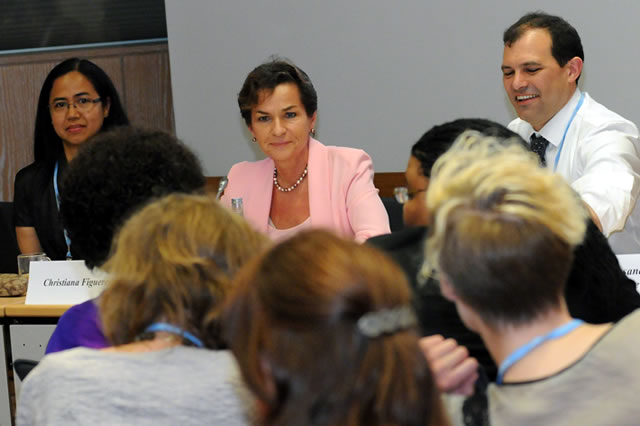Efforts to strengthen gender balance, enhance the empowerment of women and advance gender-sensitive climate policy were among the topics discussed at the side event on ‘Promoting gender balance and the empowerment of women in the UNFCCC process’.
Gender representation targets, a fund to support women in international global policy negotiations and a publicly tracking the process of achieving gender balance in decision-making organisations are among the recommendations made by the authors of a new study on gender balance in climate change negotiations.
Efforts to strengthen gender balance, enhance the empowerment of women and advance gender-sensitive climate policy were among the topics discussed at the side event on ‘Promoting gender balance and the empowerment of women in the UNFCCC process’.
The event was organised by the Mary Robinson Foundation – Climate Justice, UN Women, the Global Gender and Climate Alliance (GGCA) and the United Nations Framework Convention on Climate Change (UNFCCC) secretariat. It focused on aspects of Decision 23/CP.18, the ‘Doha Miracle’ gender decision that was agreed by all Parties to the UNFCCC at COP 18 last year:
‘Promoting gender balance and improving the participation of women in UNFCCC negotiations and in the representation of Parties in bodies established pursuant to Convention or the Kyoto Protocol.’
Speakers at the event included members of the Troika+ of Women Leaders on Gender and Climate Change Ambassador Nozipho Joyce Mxakato-Diseko, South Africa, and Christiana Figueres, UNFCCC Executive Secretary.
In her opening remarks, Ambassador Diseko, Deputy Director-General of the Multilateral Branch of South Africa’s Department of International Relations and Cooperation, welcomed the fact that women have been in leadership positions since COP 16, with women fulfilling the role of President at COP 16, COP 17 and COP 18, and with Christiana Figueres at the helm in the UNFCCC Secretariat.
She stressed that “women bring collaboration,” adding that this “moves the process forward.” She called for parity of representation in the process and for changes in the culture and language of the process. Christiana Figueres called for gender sensitive climate policy at a global level, but added that, in order for this to be achieved, policies must be designed so that they are appropriate to the culture, country and community under consideration. She encouraged Parties to submit proposals to the UNFCCC secretariat by 2 September 2013 on options and ways to advance the goal of gender balance, which is provided for under Decision 23/CP.18.
In response to a comment from the audience on the need to recognise the domestic and childcare work done by many women, Ms Figueres said women will never want to give up the right to care for their children, and need to have the courage to stand up to the task of achieving gender balance in intergovernmental processes. She stressed a gender-sensitive climate policy should differentiate between policies that can enable men and those that can enable women to contribute to climate change solutions.
Verona Collantes, Inter-Governmental Specialist at UN Women, formally launched the joint UN Women – the Foundation publication The Full View: Advancing the Goal of Gender Balance in Multilateral and Intergovernmental Processes. The report includes a set of recommendations for Parties and observers to the UNFCCC to consider in preparing their submissions to the UNFCCC secretariat by 2 September 2013.
Commenting on gender quotas, Aleksandra Blagojević, Program Officer at the Inter-Parliamentary Union (IPU), said that while quotas are not an ideal solution, they are a necessary temporary measure because gender balance is not happening naturally.Panel moderator Rob Bradley from the UAE delegation reiterated that targets for gender balance are all in service of a greater goal: gender-sensitive climate policy.
Lorena Aguilar Revelo, Global Senior Gender Advisor at the International Union for Conservation of Nature (IUCN), said the challenges to achieving gender sensitive climate policy include: implementation; avoiding complacency; and accountability; but she also added that “we’ve come a long way” from the “sin by omission” of gender considerations in the UNFCCC prior to 2007.
Chair of the UNFCCC’s Subsidiary Body for Implementation and head of the Polish delegation Tomasz Chruszczow thanked everyone for a “fascinating discussion” , saying how proud he was of the part he played in Decision 23/CP.18 at COP 18, and how pleased he is that Poland will host Gender Day (19 November 2013) at COP 19 in Warsaw.
A lively discussion with the audience followed and resulted in the event running 30 minutes over time, with comments and questions from both Party and civil society representatives. Views were exchanged on: national strategies for achieving gender balance; the role of developed as well as developing countries in advancing gender sensitive climate policies; the definition of gender parity; the challenge of gender balance for small delegations; the cultural implications of women’s empowerment; the balance of work and family commitments for women and men; the importance of training and awareness at a country level on gender equality and women’s empowerment; the need for structural changes such as access to land and legal rights for women; and the critical role of finance as a means of implementing gender-sensitive climate policy.
Rob Bradley closed the session, summarising that gender balance is just the tip of the iceberg in terms of the changes required to realise gender equality and women’s empowerment. However he stressed that “these changes can come; there are things that we can do here to be supportive”.
Related Links:
Our Work: Women’s Leadership on Gender and Climate Change
UN Women and Mary Robinson Foundation – Climate Justice launch gender balance report
Affirmative action can restore gender balance at UN climate talks – Report – RTCC, 07 June 2013
Earth Negotiations Bulletin ‘On the Side’, 7 June 2013 (scroll down for ‘Promoting Gender Balance and the Empowerment of Women in the UNFCCC Process’)



